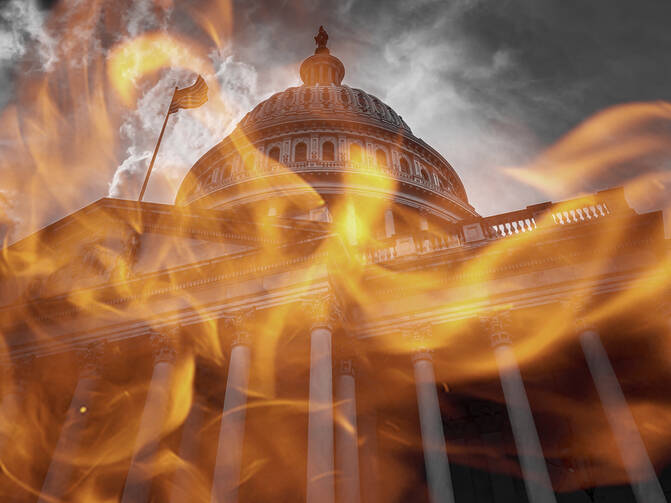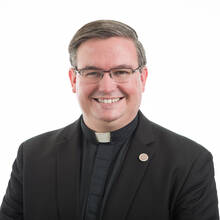This essay is a Cover Story selection, a weekly feature highlighting the top picks from the editors of America Media.
Is politics bad? The headlines certainly suggest so. Violence in Gaza. The threat of civil war in Ethiopia. Paralysis in the face of deteriorating climate change. Infighting in both major U.S. political parties. Rising antisemitism and Islamophobia throughout the West. Anger, resentment, division and exhausted disaffection.
This tableau of suffering and violence can tempt us to wash our hands and escape politics into something more pleasant. But it might turn out that what brings out the worst in us is supposed to bring out the best in us.
What is to be done about these ills? There are individual solutions to these individual problems, of course, but many thinkers suggest we take a step back and consider the big picture—by, for instance, retooling democracy or solving economic inequality.
While they are not without merit, it is curious how often such grand reforms steer politics away from humans and toward something else. Centering our political analysis on the human person matters if we are going to consider a more fundamental question: Is politics necessarily bad?
Are humans evil?
Differing conceptions of politics imply different anthropologies. That is, many ways of thinking about politics are traceable to how we think about humans. If you think humans are fundamentally good, you might be inclined to think that the right institutions, cultures and practices can lead them to robust peace. You might also think that politics can always get better in the direction of those ideal aspirations. So when politics goes wrong, there is something getting in the way of its healthy state. We need to identify that obstacle and correct for it.
But if you think humans are fundamentally flawed, you might think that only the most orderly political system would hold them in check. Perhaps you also have low expectations for how competently or virtuously government can be run. You may feel it is more important for a society to have a modicum of authority than chimerical justice. If politics goes awry, according to this view, that is to be expected. The real question is whether we are able to limit our worst vices, or perhaps channel them.
But isn’t it more complicated? Isn’t it possible that humans are a mix of good and evil?
This is undoubtedly true. And this conclusion presents us with two puzzles. First, how is it that humans are such a “tangled weave,” as Shakespeare wrote? And given such conditions, how can our politics bring out the best of us rather than the worst?
If you think humans are fundamentally flawed, you might think that only the most orderly political system would hold them in check.
One of the best descriptions of the divided human heart I have read comes from Alan Jacobs in his brilliant book How to Think. I have taught with it a few times, and my students love it.
One of Jacobs’s critical insights: We do not think for ourselves. Humans are social animals, and so we are social thinkers. We are highly influenced by the groups we belong to, and they tell us what to think—or rather, they short-circuit our own thinking in favor of adopting thoughts that the group holds. We think with our in-group not only to save mental energy but also to avoid the risk of social isolation. If we are not “in” with our group, where does that leave us?
According to Jacobs, politics allows us to connect with others in ways that help us to become fuller versions of ourselves, but it also leads us to treat other people with contempt. Humans are built for happiness, but there is something else that comes out to play, and especially in politics.
Thinkers from time out of mind have recognized this tension: Politics can bring out the best and the worst of humans. This is where the Fall, which has been called Christianity’s most empirically verifiable teaching, comes in. In the theological anthropology conceived by classical Christianity, humans are created as good but fallen. Christianity thus chastens those who would perfect politics through technical solutions as well as those who would abandon political life as the irredeemable domain of sin—the “Devil’s playground,” as Jacques Maritain playfully referred to it.
If you agree that humans are not simply good or bad, you might still be confused about the second puzzle: Given that insight, how can our politics bring out the best of us rather than the worst?
How do we live politically after the Fall?
In other words, what do we expect from politics? What should we expect from it?
Following biblical wisdom, we might put it this way: Political life ought to have lofty goals, and yet we should temper our expectations for the attainment of those goals. To put it in terms of the German political philosopher Leo Strauss, we could set low goals with high expectations, but that would seem to miss what is great in humans. We could also set high goals and high expectations, but that would seem to be almost inhuman in its demands.
Political life ought to have lofty goals, and yet we should temper our expectations for the attainment of those goals.
This is perhaps the best insight from the tradition of Socrates, Plato and Aristotle: Humans are special, and their happiness is something exalted, yet they are seemingly hampered in the exercise of their reason toward that happiness. We might say that biblical wisdom, at the risk of abstraction, reveals both the nature of human happiness (which is to say friendship with God) and the considerable obstacles to its attainment, the flaws in our reason and will.
It is nearly impossible to hold these two ideas in tension, much less to live out that tension. Yet that tension is one of the greatest gifts the Gospel gives the human family. Two things can both be true: When politics goes wrong, that is to be expected, but we can still take action toward a healthy politics. We should pursue virtuous politics, but we should do so humbly, mindful that we are creatures, not the creator.
Thus, we return to a central challenge of Christianity: attention to what matters most:. seeking first the kingdom of God, keeping the end before us always, and recognizing our principle and foundation.
This is part of a series of columns by Bill McCormick, S.J., on the 2024 election. Also read: “How to prepare for next year’s elections? Here are 3 tips to keep you spiritually sane.”








